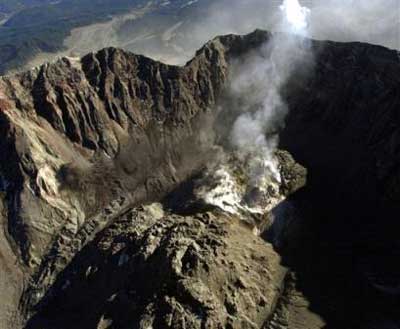|
 SEATTLE
- The stone "fin" on the new lava lobe inside
the crater at Mount St. Helens seems to be starting to
split. SEATTLE
- The stone "fin" on the new lava lobe inside
the crater at Mount St. Helens seems to be starting to
split.
The fin, which is about 200 feet tall
and 300 feet wide, is building on the new lava dome, which
is about 1,600 feet in diameter and 400 feet high, U.S.
Geological Survey geologist Tina Neal said Friday.
The exact dimensions of the new structures
have not been determined because of steam and fumes. The
fin's precise makeup also cannot be known until scientists
can find a way to pick up a sample for analysis, said
Carolyn Bell, a USGS spokeswoman.
Scientists are working on a way to safely
get samples of the fin, which apparently was on the surface
before the new lava flows, and also the new lava slowly
extruding from the volcano, Bell said.
The mountain was shrouded in fog and clouds
Friday, but brief views inside the crater from aircraft
showed bright red lava glowing in spots on the gray lava
dome.
Scientists continue to warn that the eruption
could intensify at any time, but the USGS said earthquake
activity remained low Friday, and levels of gas found
above the crater, which could indicate a stronger eruption
was in the works, were unchanged.
The latest dome-building began with tiny
earthquakes Sept. 23, apparently from magma breaking through
rock as it rose toward the surface. Several steam bursts
followed, and geologists detected lava at the surface
late Monday.
The last round of dome-building began
in the months after St. Helens' devastating May 18, 1980,
eruption, in which 57 people died, and lasted six years.
Gas-rich magma can cause explosive eruptions,
but samples taken this week have detected little carbon
dioxide or hydrogen sulfide at the surface, Neal said.
As the dome-building continues, it could
produce small explosions with little warning, Neal said.
A large explosion is still possible but is among the least
likely scenarios, she added.
|